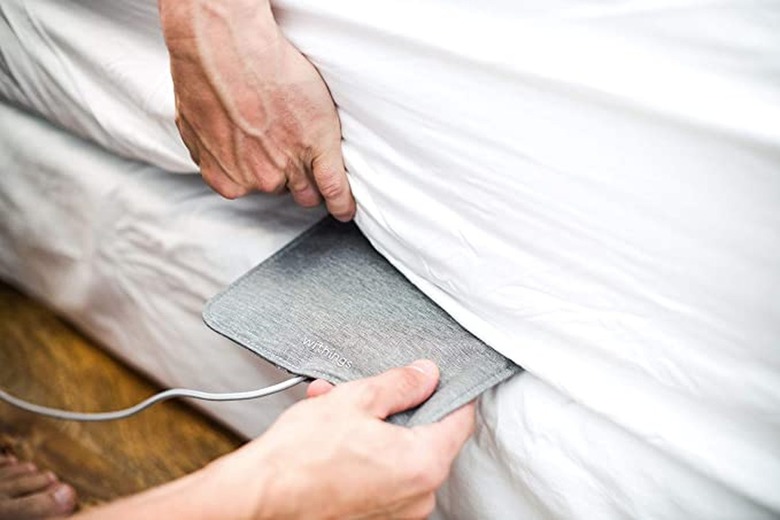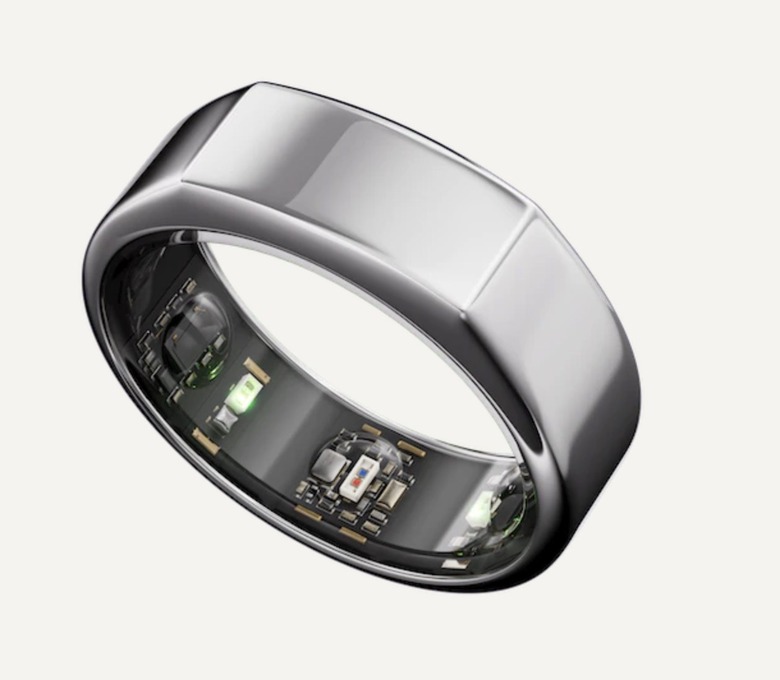The Best Sleep Trackers For A Better Night's Rest
If it weren't for sleep trackers, sleep assessments would probably be out of reach for most people (whether it's due to time or financial constraints), as the typical model for tracking sleep involves overnight polysomnography (or a sleep study) complete with electrodes affixed strategically on your body to detect the electrical activity in your brain, to track your muscle movements, and to record your heart rate. Sleep trackers, however, vastly improve accessibility for sleep data. And in most cases, the information is sent to an app on your phone so you can explore and dissect the metrics and, perhaps most importantly, modify your sleep patterns to your heart's content.
So, what are sleep trackers?
So, what are sleep trackers?
Simply put, sleep trackers are devices that monitor your sleep. And while they can provide sleep data and give you some insight on your 40 winks, it's worth noting that these devices can only do so much. Specifically, they cannot measure your brain activity or eye movements directly. What they can do, however, is use certain data points, such as your heart rate, body movements, breathing rate, and skin temperature, to paint a picture of your sleep patterns, sleep habits, sleep stages, sleep quality, and sleep duration.
Sleep trackers are available in both wearable and nonwearable versions, and there are budget-friendly options and not-so-budget-friendly options. Long story short, you've got options. And we get that, so we pulled together a list of some of the best sleep trackers on the market to get your search off on the right foot.
The Best Sleep Trackers
1. Best Overall: Oura Ring Gen3, $299
Unlike most of the wearables on our list, the Oura Ring Gen3 is a ring, not a wrist-worn wearable. But don't let its small size fool you. This sleep tracker elegantly tracks your sleep patterns as well as your daily activity.
The Oura Ring is designed with sensors that measure your body temperature, heart rate, and blood oxygen levels throughout your day and night. And using data points like total sleep time, time spent in each sleep cycle, and your heart rate variability, the Oura Ring can give you a good idea of how well you slept the previous night. In addition to a sleep score that lets you know where you're at, the Oura Ring also gives you personalized recommendations to help maximize your sleep time.
Beyond tracking your sleep, the Oura Ring is also a fitness tracker that's capable of measuring data such as steps taken, calories expended, and even periods of inactivity.
If the Oura Ring tops your list of sleep trackers, you should know that it has a long battery life (up to seven days on a full charge), it's fast-charging (you can get a full charge in 20 to 80 minutes), and the ring is ultra lightweight and water-resistant. It may also be worth noting that the Oura Ring is placed with sensors on the palm side of your finger, so it's more accurate across all skin tones.
2. Best Budget Sleep Tracker: Fitbit Inspire 3, $99.95
Coming in at under $100, the Fitbit Inspire 3 hits our list as the best budget sleep tracker. While the Fitbit Inspire 3 will give you a basic idea of how much time you spend sleeping each night, the premium membership digs a little further into the details, telling you how long you spend in light sleep, deep sleep, and REM sleep. And while that can be a lot of information (or just enough), keep in mind that the Fitbit Inspire 3 is not an activity tracker, so you won't get a comprehensive snapshot of your overall health and activity like with some sleep trackers.
That said, the Fitbit Inspire 3 can check for signs of an irregular heartbeat, it gives you reminders to get moving, and it can sync with your smartphone so you can get notifications on your Fitbit screen. And as a final feather in its cap, the Fitbit Inspire 3 has an impressive 10-day battery life.
3. Best Under-Mattress Sleep Tracker: Withings Sleep Analyzer, $129.95
Anyone looking for more comprehensive sleep data may want to ditch the smartwatch trackers and opt for Withings sleep analyzer instead. Developed with sleep physicians, this under-mattress analyzer tracks sleep cycles, but it can also detect snoring and show the severity of sleep apnea. Plus, it continuously monitors your heart rate while you sleep. If all of the above weren't plenty, the Withings sleep analyzer also gives you a sleep score so you can see how restorative your sleep was, and it provides actionable insights to help you improve your sleep. And for another unusual feather in its cap (as far as sleep trackers go), the Withings sleep analyzer shares a PDF of your sleep data that you can share with your doctor.
This easy-to-use sleep tracker requires a one-time setup, it's suitable for all sleeping positions, and it plugs into an electrical outlet, so there are no concerns about battery life and dead gadgets.
4. Most Versatile Sleep Tracker: Kokoon Nightbuds, $249.99
Developed by sleep scientists, the Kokoon Nightbuds are a one-and-done wearable. While they can be used like regular earbuds to stream music or soothing sounds while you sleep, the Kokoon Nightbuds are designed with an optical heart rate monitor (in one earbud) to track your sleep patterns.
However, those who think this is a cool idea should consider that the data provided by the Nightbuds is relatively simple. Sleepers can see the duration of their sleep and the time spent in each sleep stage (potential indicators of sleep quality and quantity), but in the end, there's no deep analysis of what that data means nor will you find or have access to personalized advice on how to improve your sleep.
Getting back to audio (which may be where the Nightbuds shine), the app features a wide selection of white noise and nature sounds as well as a library of guided meditations and abstract music. So, ultimately, users can create their own personal sleep soundtrack.
Surprisingly, the Nightbuds are comfortable and stay firmly in place (even if you're a side sleeper) courtesy of the stretchy headband and the soft silicone earpieces.
5. Best Bedside Tracker: SleepScore Max, $149.99
As far as sleep trackers go, wearables tend to dominate the market. But in an almost counterintuitive approach to sleep tracking, SleepScore Labs offers contactless sleep sensor technology with its SleepScore Max.
This bedside sleep tracker features a contactless bio-sensor that detects changes in your movement and breathing. (It's also equipped with environmental sensors that detect and measure the amount of light in your room, the temperature, and ambient noise.) The SleepScore Max takes all of that data and throws it into the brand's proprietary algorithm, and the result is sleep tracking with remarkable accuracy.
Once the algorithm does its magic, users wake up to a sleep score (ranging from 1 to 100) indicating their overall quality of sleep as well as a breakdown of their sleep cycles.
The SleepScore Max pairs with your phone via Bluetooth and then sits on your bedside table. Before bed, users are prompted to enter information about their day, including details about alcohol and caffeine consumption, dietary intake, exercise, etc. When you're ready to sleep, simply switch on the sleep-tracking mode and let the machine do its thing.
Overall, the SleepScore Max is a nice option for those who would prefer to skip clunky wearables, but while this may seem like a passive approach to sleep tracking, it's really not. Remember that while machine learning is pretty great, it's only as good as the data it's given. Ultimately, the SleepScore Max may be accurate, but to get there, you'll have to do your homework.

